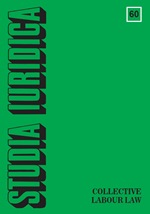Collective Representation of Public Sector Employees
Collective Representation of Public Sector Employees
Author(s): Zbigniew GóralSubject(s): Law, Constitution, Jurisprudence
Published by: Wydawnictwa Uniwersytetu Warszawskiego
Keywords: collective representation; the public sector employees; the right of coalition; public sector; the International Labour Organization; public administration; the right of association in trade unions; collective bargaining; collective disputes
Summary/Abstract: The author concentrates on the collective representation of public sector employees. The path that had led to guarantees for the right of coalition in the case of those employees has been much longer than in case of other professional groups. The idea of subordination of civil servants’ personal interests to the interest of the state collided with the right of coalition. Nowadays, the right of persons employed in the public sector to associate is a generally recognized international standard, guaranteed especially in the conventions of the International Labour Organization. Of course, exceptions of various nature are allowed. In Poland, persons employed in the public sphere under contracts of employment are generally entitled to form and join trade unions. However, it does not mean that a full right to coalition is shared by all those employed in the public administration. The Polish legislation expressly excludes the right of association in trade unions with respect to, for example, professional soldiers, officers of the Internal Security Agency, the Central Anticorruption Bureau and the Government Protection Bureau, Constitutional Tribunal judges, the President of the Supreme Chamber of Control, the Ombudsman, judges of courts of law and many others. Moreover, as the author stresses, whether the employees would be willing to exercise the right of coalition or not depends on the powers granted to the unions. The author describes the fundamental prerogatives of trade unions in the public sector, especially their right to engage in collective bargaining and to conclude agreements, as well as the right to initiate collective disputes and organise collective actions (including strikes).
Journal: Studia Iuridica
- Issue Year: 2015
- Issue No: 60
- Page Range: 93-106
- Page Count: 14

